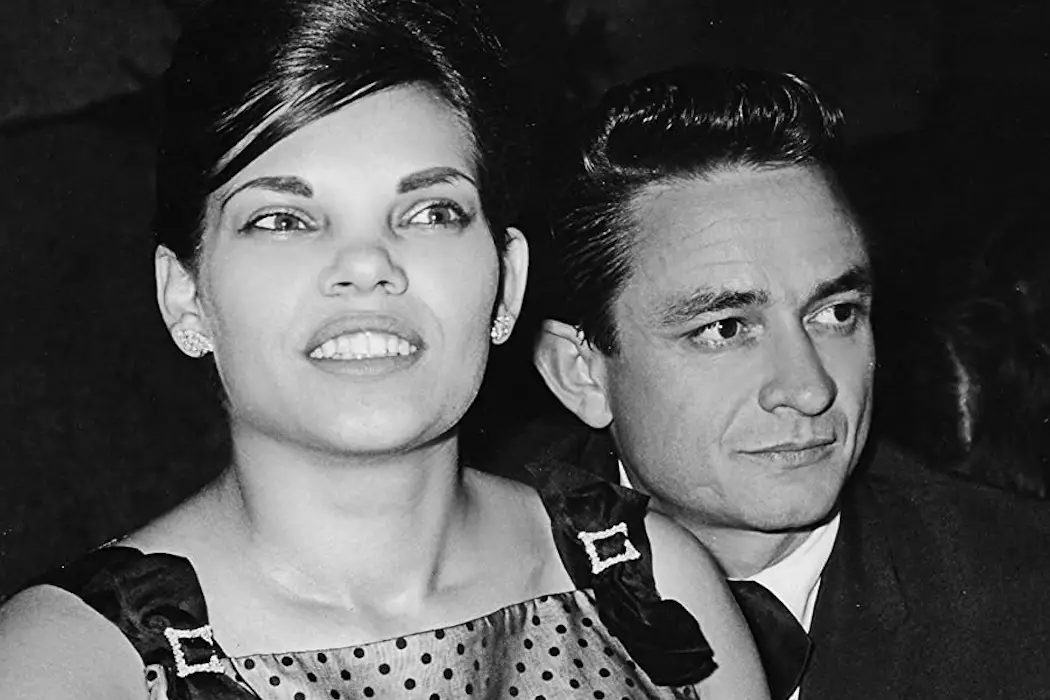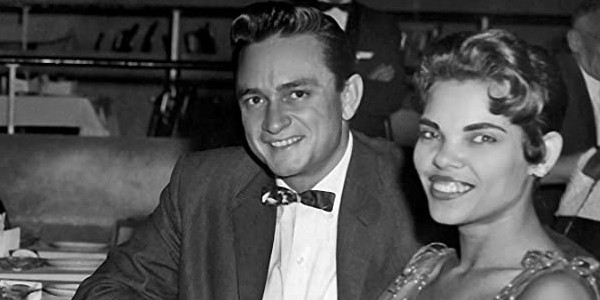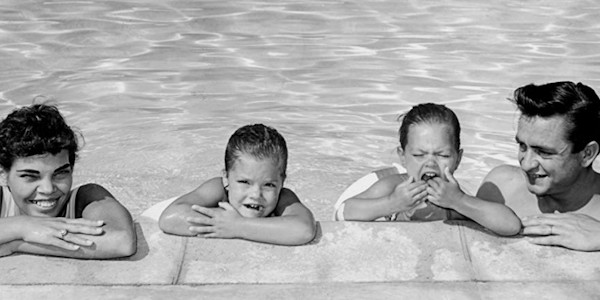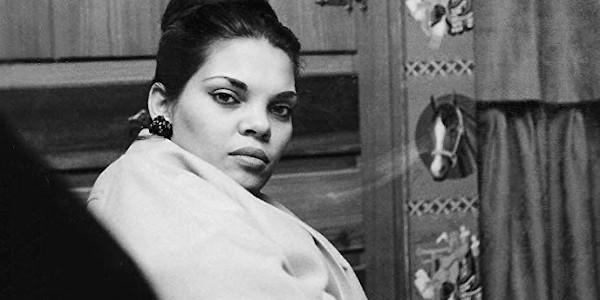Interview with Matt Riddlehoover, Director of MY DARLING VIVIAN

Luke Parker is an award-winning film critic and columnist based…
Towards the back half of his career, after Folsom Prison and even his own time behind bars, Johnny Cash didn’t need to write his own story anymore. The folklorists and the dreamers quickly grabbed hold of his triumphs (and his second marriage with June Carter) and the profiteers kept it that way, even after his death in 2003.
Of course, that process and its evolution quickly wiped Vivian Liberto, Cash‘s first wife and the mother of his four daughters, off the face of the Earth. My Darling Vivian, Matt Riddlehoover‘s SXSW-selected documentary, tells Vivian’s story and acts as a humane amendment to the Johnny Cash mantra.
Film Inquiry recently spoke with director Matt Riddlehoover about his film, including his experience interviewing the four daughters (his husband’s aunts, by the way) and gradually unveiling the sick cover-up that had shadowed the Cash family for decades.
Luke Parker for Film Inquiry: As a director, your proximity to the heart of this film is incredible. When did you first decide to make a movie about it?
Matt Riddlehoover: My husband and producing partner, Dustin Tittle, is the grandson of Vivian and Johnny Cash. So my mother-in-law, Kathy Cash Tittle, had told me stories about Vivian over the years that kind of conflicted what I, and I think everyone else saw in the 2005 film, Walk the Line. And back in 2017, [a friend] suggested that I make a film about Vivian. It seemed a little overwhelming and like it would be a huge responsibility to tell this story.

But Dustin and I talked about it for a couple of weeks at length and decided the only proper way to do it would be to have Roseanne, Kathy, Cindy, and Tara all on board and involved. And within 24 hours, I had gotten blessings from all of them and we were able to move forward.
So, during that initial permission process, you met no kind of resistance at all?
Matt Riddlehoover: No, which, as you see in the film, four very different women and they all had the same opinion: that [I] had to do this.
That’s fantastic. Given the intimacy and just the pure emotion of the story, I thought there would have been something. And I can only imagine how nervous you were.
Matt Riddlehoover: Sure, and if I can, I think there was some nervousness on their part too because it was a lot to talk about and a lot to unpack. For decades, they’ve only ever been publicly asked about their father and even as sisters, I don’t think that they had talked about their upbringing much together as adults. So, in watching the film and seeing these separate interviews cut together, [I think] that they were learning things for the first time from their own siblings.
It’s an excellent point that they were never asked to talk about Vivian publicly, especially when you consider how much they’re able to recollect. There’s so much information from all of them about the history of the family and their marriage. And you know it’s a lot easier to remember things when you’re getting asked about them over and over. So it’s great that you were able to mine so much information from them.
Matt Riddlehoover: Yeah, yeah.
Once you began shooting and you started to turn the story into a film, was there ever a time that you hesitated to investigate or dive deeper into an interview?
Matt Riddlehoover: Um, yes. I started with Kathy – Kathy was my guinea pig and honestly, she was the easiest point to start for me because I had the most access to her. I had heard so many stories just sitting at her kitchen table, or hanging out in the living room. And so, going into it, I had this outline based on Vivian’s manuscript, her published memoir, and my candid conversations with Kathy.
And then cut to the very next day, Roseanne comes in and sits down, and brings so much more to the table that I hadn’t even counted on: things that weren’t in the book, things I hadn’t heard from Kathy. She was ready to unpack it all and I was scratching things off my outline left and right because I’d ask her a question and she’d answer ten [of them].
It took some time after that to cut together a version of the film that was just Roseanne and Kathy, and to kind of play them against each other and figure out where things were going. So, a couple of months later, I sat down with Cindy and then Tara to ask them about the things I learned talking to both Kathy and Roseanne [because] I wanted to see where the memories matched up. So that was interesting. And then, of course, being able to illustrate all of that was its own thing.

To answer your question more fully, I realized, “oh, there’s this thing in Vivian’s book that we don’t really touch but it seems like it was a really important moment for her.” So things like that happened. But most of [the film] came from four separate days, anywhere from four to six hours with all four of the daughters.
I wanted to ask about that interview process because the timeline in the film is so impressively constructed; you weave between all four of the stories so well. I’m kind of surprised that there was such a delay between the interviews. Was it difficult to frame your questions in a way that would mesh the testimonies together?
Matt Riddlehoover: No. No, I don’t think so. It was all so conversational anyway and “in the moment” – kind of laid back and relaxed, except, of course, when it got a little emotional. But with my outline, after Kathy and Roseanne, I changed certain questions and what I was asking of Cindy and Tara so that it would cut [together].
I have to talk about this, because it’s unavoidable. It’s just a titanic part of this story.
Matt Riddlehoover: Uh oh [laughs].
When people talk about Johnny Cash and June Carter, they talk about it being a love story for the ages. This film seems hellbent on debunking that myth, or at least part of it. And I don’t mean that as a criticism in the slightest, but rather a compliment considering that’s what the best of documentaries do. As you were learning about Vivian and her life, was there a piece of information or an incident you discovered that drove the counter-culture aesthetic of the film?
Matt Riddlehoover: Oh, wow. I have to say, Luke, all of this, even before this film started, I had heard stories from my mother-in-law about how upsetting Walk the Line was and how her mother has been portrayed, or not been portrayed in some cases throughout the years.
So, the marketing machine didn’t really like that John had two great loves in his life. It was all about selling the second marriage and the story of being “saved,” and all of that. That definitely went into it and I knew it was important to talk about it because let’s face it, we’re all human and this is a story about a family. It’s entirely possible to have one life and have one great love and to move on and have another. But it’s also possible to hurt someone in that process, and that’s what it was all about. It’s all possible for there to be healing, and it’s also possible to move on, and it’s also possible to move on the way most families do.
[With this film], it’s important to say, “Hey, this woman has been erased, but in real life, she was always there.”It’s amazing how easily you’re able to put Vivian back into the [Carter-Cash] narrative because it feels like a major cover-up. I thought maybe it was just Walk the Line when I first heard about the story, but it’s everybody, to the point where Johnny’s memorial service feels like the worst propaganda you’ve ever seen. How did it make you feel when you first learned the extent to which that movie buried Vivian’s story?
Matt Riddlehoover: Luke, it was a gut punch. I don’t think that even their daughters realized the extent of it. Think about this: the memorial tribute, they’re all a wreck anyway. They just lost their beloved father and they have to share him with the entire world, so they’re probably not thinking about how his life is being portrayed and that their mom isn’t a part of it.

I have to thank Rodney Crowell for pointing that out and making me revisit it, which is something I talked about earlier but didn’t specify what it was. The memorial tribute is how Vivian’s book opens. I didn’t really know how to talk to the daughters about when I interviewed them because it seemed like so many other things were more important to discuss. And it wasn’t until I went to Rodney’s house and gathered some home movies that he had taken in the late ’70s and early ’80s when he and Roseanne were together, that he mentioned, “it’s crazy how she’s been erased over the decades. I dedicated a song to her at the memorial tribute and when it aired on TNT, they cut it.”
So, in the archival process, I came upon the edited and unedited versions, and sure enough, there it was and there it was not. I understand cutting things for time but come on, out of a three-hour service that they cut down to two, that’s what gets cut?
It felt very vindictive.
Matt Riddlehoover: Oh yes, yes. That, coupled with so many other revelations, made me ask why some of the things that happened to this woman were not in the history books. It was nuts.
I wanted to transition real quick because I know this is your first documentary in nearly a decade. The film begins with the idea that each girl grew up with a different mother, given Vivian’s escalating hardships and the health of their marriage. And I think you do a really great job of presenting those four different images of her by having each daughter talk separately and intimately with you and the camera. Why did you decide to conduct the interviews that way, with each daughter by herself?
Matt Riddlehoover: So I guess the tidiest answer is that a few years back, probably a year before I decided to do this, I attended an event at the Country Music Hall of Fame where all four of them sat on a couch together, talking about the photos and letters that their father sent their mother when he was stationed overseas. And the differences of opinion came out – the light, charming banter and bickering over who was right.
I just felt that for this, it was important to keep them all in their own space and to be very comfortable and sure of what they were saying. Then you can use editing to show the differences because, you know, memory is such an interesting thing in and of itself.
I think the whole trick of the thing is keeping them comfortable, and feeling comfortable in sharing whatever they felt like sharing without feeling like it was going to be challenged.
I saw this movie for the first time when it was part of SXSW on Prime, and since then, one scene’s become even more relevant. You spend a lot of time exploring the period where a great deal of the country was convinced and horrified that Vivian was Black. As I said, the weight of those scenes has grown stronger recently, but can you touch on why you wanted to spend so much time in that arena?
Matt Riddlehoover: I think, also, to be fair to Vivian’s truth and her experience, it’s not something that she spent much time on in her own book, nor did she really talk about it with her daughters.
After spending two-and-a-half years combing through her life and all of these materials, finding out what she went through, and just kind of sitting in it day after day, she was trapped in that house in the middle nowhere for nearly a decade. And then you have this climatic period during all of that, where no, it’s not just drunk fans showing up; no, it’s not a rattlesnake; no, it’s not a bobcat; it’s the KKK you’re afraid of. It’s the KKK that’s keeping you up at night with a shotgun and cigarettes guarding your four little girls, while your husband is off with no way to contact him. You’re alone and you’re frightened and you’re terrified.
It was important to touch upon for many reasons but mostly because she went through so much. Racism, in and of itself, is a virus and it’s really sad to know how long ago that was and how, in 2020, it’s not that much better.
We’ve been talking about how there’s this difference of opinion between the four girls, the four daughters. Obviously, they spend most of this film talking about their mother, which of course incorporates [some bad memories] of their father. And yet, in the film, it’s clear that there’s still a great adoration from all of them. Was it easy to combine the two sides of that story and that relationship together.
Matt Riddlehoover: Oh my gosh, yes. This is a family like any other. Yeah, there were tough times. Yeah, there were really complicated feelings and situations, but there was no love lost. They all had wonderful, tremendous relationships with their father and their mother and even their step-mother. So, the movie was just about shedding a light on the human aspect that the “great myth” [left behind].
Film Inquiry thanks Matt Riddlehoover for his time.
My Darling Vivian will be available on VOD and Virtual Cinemas Friday, June 19th.
Watch My Darling Vivian
Does content like this matter to you?
Become a Member and support film journalism. Unlock access to all of Film Inquiry`s great articles. Join a community of like-minded readers who are passionate about cinema - get access to our private members Network, give back to independent filmmakers, and more.
Luke Parker is an award-winning film critic and columnist based in the Baltimore-Washington metropolitan area. As an entertainment journalist, he has interviewed several members of the film industry and participated in some of its most prestigious events as a member of the press. Currently, he is working to obtain his bachelor’s degree in Mass Communication at Towson University.













